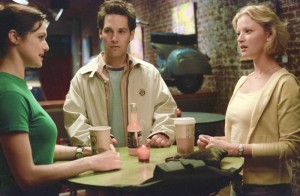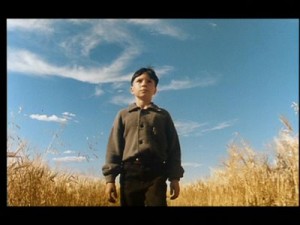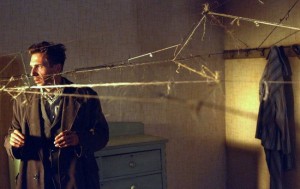From the Chicago Reader (May 23, 2003). — J.R.

Neil LaBute (In the Company of Men, Nurse Betty) delivers his most interesting and powerful film to date, though it’s also his most unpleasant and disturbing. Set at a small college, it concentrates on the evolving relationship between a shy nerd (Paul Rudd) and a brazen artist (coproducer Rachel Weisz), as well as his best friend (Frederick Weller) and the latter’s fiancee (Gretchen Mol) — and the less said about the plot the better. LaBute originally wrote this as a play while directing Possession (its opposite in every respect), and it often betrays its theatrical origins, though never to its disadvantage. LaBute has a lot of troubling things to say about both relationships and artists, and the writing and ensemble playing are so ruthlessly focused they hurt. 97 min. Century 12 and CineArts 6, Esquire, Landmark’s Century Centre.
 Read more
Read more
From the Chicago Reader (March 14, 2003). — J.R

Reeking with allegory, Andrew Wyeth landscapes, undigested Flannery O’Connor, variable performances, and all kinds of ambition and pretension, this 1990 first feature by English writer-director Philip Ridley is an American gothic melodrama set in the Idaho prairies. It’s typical of the overall conception that mass murderers and child molesters figure as incidental characters and as a collective deus ex machina for a plot already so full of grotesqueries that they’re barely noticed. The plot centers on an eight-year-old boy whose playmates are abused and murdered and who thinks a neighboring English widow is a vampire; his father is a weakling with a homosexual incident in his past who commits suicide, his mother is a borderline psychotic, and the local sheriff is a veritable catalog of mutilations. The story opens with an exploding frog and also makes room for an alcoholic religious fanatic and stillborn child that the hero uncovers and thinks is one of his murdered playmates. With Viggo Mortensen, Lindsay Duncan, Jeremy Cooper, and Sheila Moore. 95 min. (JR) Read more
From the Chicago Reader (March 14, 2003). — J.R.

David Cronenberg isn’t credited often enough for his literacy, which anchors him as a filmmaker much as Method acting can anchor some performers: he seems to immerse himself so deeply in the warped visions of certain writers that he re-creates their work whereas most literary filmmakers would simply imitate it. This tour de force, which Patrick McGrath adapted from his own novel under Cronenberg’s supervision, draws us into the consciousness of a schizophrenic (Ralph Fiennes) who’s been incarcerated for most of his life and whose boyhood traumas merge seamlessly with his current existence in an east London halfway house; apparently Cronenberg’s model is not only McGrath but Samuel Beckett in his early novels. The film asks us to piece together what really happened in the past, and even after two viewings I haven’t entirely succeeded, but I was floored by Cronenberg’s mastery of the material. Fiennes gives one of his finest performances; Miranda Richardson, playing at least three characters in the protagonist’s twisted vision, is no less impressive; and Gabriel Byrne, Lynn Redgrave, and John Neville do excellent backup work. A lean and densely packed 98 minutes, this minimalist chamber thriller is at once hallucinatory and terrifyingly real. Read more




